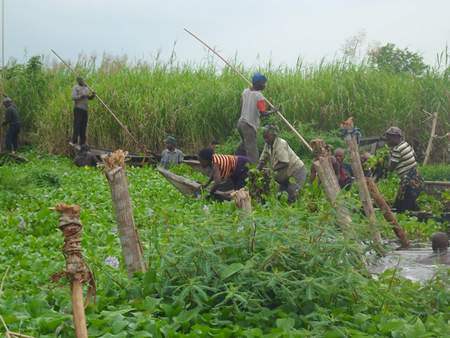-
About
- Our Work
- Get Involved
- Stay Updated
 With up to 9.3 billion people to feed in 2050 in the world, it becomes urgent to find ways to increase agricultural productivity across Africa, the second most populated continent.
With up to 9.3 billion people to feed in 2050 in the world, it becomes urgent to find ways to increase agricultural productivity across Africa, the second most populated continent.One option developed so far by humans is “boosting” soil fertility with chemical fertilizers. But is this option sustainable? What are alternatives to chemical fertilizers do we have?
Implications of using chemical fertilizers
Man has excessively (over-)used chemical fertilizers. The nutrients of the same soils have not been replenished, making them unproductive on the longer run.
We now see that the (over-)use of chemical fertilizers that were supposed to help increasing yields degrades lands and makes agriculture not really profitable for farmers. In some cases were lands are affected by advanced degradation, chemical fertilizers appear like the panacea.But they are not! When also consider the potential risks of poisoning, burns, cancers, birth defects and environmental degradation, chemical fertilizers should be used with extreme cautious. There is strong need to develop alternatives, helping farmers to reduce the use of chemical fertilizers; and ideally: to stop using them altogether.
Promoting organic agriculture as an alternative?
Organic agriculture is a proven alternative to promote a more sustainable use of lands and its resources.
“Organic agriculture is one of the best practices in ensuring environmental sustainability. It sustains the fertility of soils, ecosystems and sustains the health of people. It relies on locally adapted improved ecological processes and cycles, and natural biodiversity rather than the use of synthetic inputs and genetically modified materials.” Those were some of the words by which the Honourable Emmanuel T. Chenda, MP, Minister of Agriculture and Livestock of Zambia, launched the 2012 Second African Organic Conference, entitled “Mainstreaming Organic Agriculture in the African Development Agenda” held in Zambia.
Organic agriculture involves the principles of health, ecology, fairness and care to ensure we are producing food to satisfy our current and future needs.
How organic farming is attracting youth
In Zambia, a group of volunteers sponsored by the British Council held a meeting to offer an alternative to fertilizers and allow people to grow more and “better” food, in a sustainable way. Solid waste transformation into compost was one of the techniques presented.
Since that meeting nearly a dozen chiefdom’s have adopted the ideas placed in front of 150 young people and the number will grow as more workshops are held. All who attended left wanting to both know more and tell others of “new” (some may say “old”) ways of growing food, raising the profile and status of farming, so encouraging young people to stay and grow crops.
Attracting youth to agriculture in rural Zambia will have some meta-consequences: it is not only growing more food, but also reducing rural-urban drift and have positive impacts on a number of socio-economic problems, such as HIV-AIDS for which Zambia has one of the largest rates in Africa.
Another experience in Benin
In Benin, where the economy is based on agriculture, soil infertility is an issue. The NGO “Actions pour l’Environnement et le Développement Durable” (ACED) based in Benin, is encouraging farmers to fertilize their soil using compost made of water hyacinth from Lake Nokoué (Read more on this project).
Water hyacinth can be a good source of nutrients for the soil. Water hyacinth can be used either as green manure or compost. As green manure, it can be buried in the soil or used as mulch.
The plant is ideal for composting: After removing the water hyacinth from its habitat (typically a lake or pond), it can be left to dry a few days before being mixed with ash, soil and animal manure. Microbial decomposition decomposes fats, lipids, proteins, sugars and starches. The mixture is left in the compost pile; the heat of tropical climates allows accelerating the process and producing rich compost that can be applied directly on the soil.
Water hyacinth compost increases soil fertility and crop yields and, in general, improves the quality of the soil. This activity is engaging many rural youths who collect the water hyacinth and transform it into compost to be sold to farmers.
Linking into the 6th Africa Agriculture Science Week
In Accra, from the 15th to 20th, the 6th Africa Agriculture Science Week (AASW6) will focus on the topic “Africa Feeding Africa through Agricultural Science and Innovation”. During this continental event, major agricultural development and research organisations will gather to discuss “what agriculture we want for Africa”. One response is that we need agriculture that produces enough to feed Africa’s growing population while protecting land and other natural resources for future generations.
What alternatives do you know to reduce or substitute the use of chemical fertilizers in Africa?
What are the strategies to ensure farmers use them?
How can we better interest youth into organic agriculture?Share your experiences, in the comments section, to reinforce a more land-protective agriculture in Africa!
Source: Original Blogpost by Frejus Thoto, with input from John Birchall on the FARA-AASW Blog.
Picture courtesy ACED BeninAbout the author
Related Posts
Comments
No comments made yet. Be the first to submit a commentBy accepting you will be accessing a service provided by a third-party external to https://www.ypard.net/
Get in touch
Email: [email protected]
YPARD Global Coordination UnitHosted by AGRIDEA and the Czech University of Life Sciences Prague
Lausanne, Switzerland and Prague, Czech Republic - Our Work

 With up to 9.3 billion people to feed in 2050 in the world, it becomes urgent to find ways to increase agricultural productivity across Africa, the second most populated continent.
With up to 9.3 billion people to feed in 2050 in the world, it becomes urgent to find ways to increase agricultural productivity across Africa, the second most populated continent.